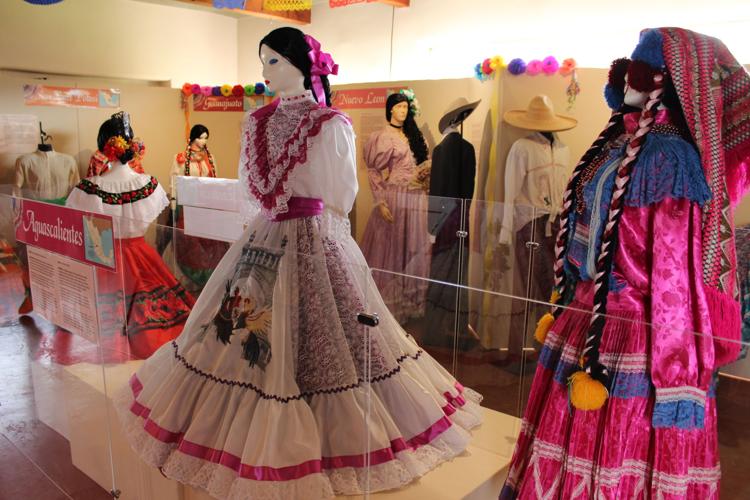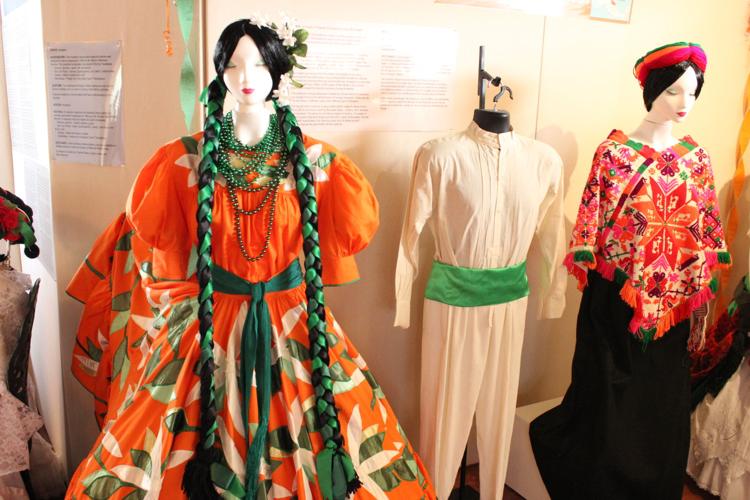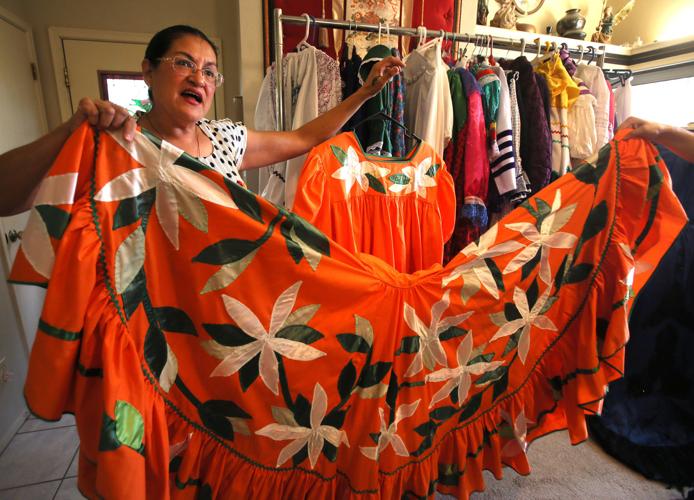For too long, Carmen Baron has stashed her collection of hand-sewn folklorico costumes in closets and corners.
Usually, she only pulls the costumes out for dances, the colorful skirts flashing on stage.
But not any more.
Since the beginning of October, historic Canoa Ranch in Green Valley has exhibited 22 Ballet Folklorico costumes, most of them handmade here in Tucson by Baron, the director of the nonprofit folklorico dance group, Danzacultura Mexicana.
They're on display until November 22, and they're really worth checking out.

Carmen Baron created the orange dress to represent the fruit and its white blossoms. The cross-stitch embroidery in the garment on the right represents the tree of life.
Mostly dresses and skirts, the costumes represent various regions in Mexico. Canoa Ranch, operated by Pima County Natural Resources, Parks and Recreation, first connected with Baron several years ago for one of its regular festivals. Baron brought dancers, but the costumes also made an impression, says Valerie Samoy, special staff assistant with Natural Resources, Parks and Recreation.
When Danzacultura Mexicana returned for another event, they brought more than their dancers. The ranch set up a tent to display a few costumes.
People loved it, Samoy says.
"The costumes should be on display, not in bins," she adds.
And so the ranch approached Baron about setting up an exhibit — in exchange for loaning a handful of costumes, the ranch would split the proceeds from the exhibit with Danzacultura Mexicana.
The rest would go toward the ongoing conservation and restoration of Canoa Ranch.
"For me, it's quite an honor to be asked to display my stuff," says Baron, adding that because her folklorico group only dances a handful of times each year, people don't get to see the costumes she has devoted her life to sewing.
She says she could lend almost 100 costumes for an exhibit without any repeats.
"I want people to know that these costumes are done right here in Tucson," she says, although she clarifies that she purchased several of the costumes on display at Canoa Ranch from Mexico.
Baron says she learned to sew maybe even before she could walk.
"My mom would put me in her lap, and I would look at the way she was sitting at the machine, and later I was able to learn myself..." says Baron, who grew up in Altar, Sonora. "My mom used to give me just little pieces of material, and I had to beg her, because there was no money, and it was hard to find materials in my hometown."
Because she lived in a small town without a TV, she wasn't really exposed to folklorico until she moved to the United States.
"I started sewing little dresses for my dolls by hand, and then I used to make bigger things for my brother and little dresses for my cousin," she says. "But my mom didn't know anything about folklorico, and I didn't either, not even what the dresses looked like."
She remembers the first time she saw a folklorico dance group as a high school student here in Tucson.
What she saw enchanted her.
"I graduated from Pueblo High School and went to Pima Community College, and saw a big sign that said, 'Mexican folk dancers,' and I said, 'That's it. I'm going to enroll,'" she recalls. "That's when I started talking folklorico classes. And I knew how to sew already, so I was asked by other students to make costumes. And since then, I've been sewing and sewing and sewing."

These dresses represent the Mexican region Jalisco.
She's currently teaching folklorico to about 25 students through Danzacultura Mexicana. She's also working with about a dozen young children at Montessori Learning School. When her students perform, they wear costumes with brilliant colors and intricate embroidery, hand-sewn by their teacher.
Over the years, Baron has received awards for the time she donates to teaching and her craftsmanship from Tucson Parks and Recreation and the Southwest Folklife Alliance, according to Star archives.
For Tucson Meet Yourself this year, she was asked to sew costumes for Polish dancers and a University of Arizona folklorico club.
It was a busy few weeks.
At Canoa Ranch, her costumes get their own stage.
"They look beautiful there," Baron says. "Much, much better than being in my closet, where they're in boxes and all squished and no one is enjoying them."
So go enjoy.
If you go:
What: Ballet Folklorico costumes from Carmen Baron's collection on display.
When: 8:30 a.m. to noon Saturdays, Tuesdays and Wednesdays, until Nov. 22, with the exception of Veterans Day on Nov. 11.
Where: Canoa Ranch, 5375 S. 1-19 Frontage Road.
Cost: $10 suggested donation.
More info: webcms.pima.gov/cms/One.aspx?pageId=1507







